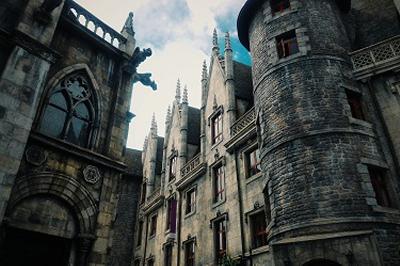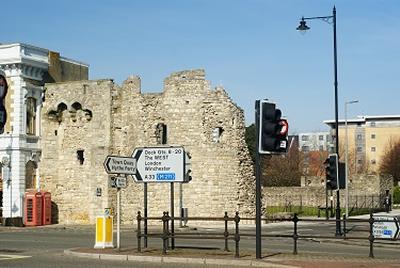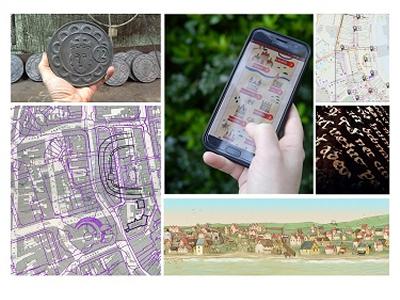People Place and the City
On 26 May 2021, the CMRC held an online interdisciplinary study day dedicated to the urban world. Its aim was to explore the dynamics that shaped urban space, cultures and identities in pre-modern societies (c. 500- c. 1700) and how present-day cities and citizens, relate to their historical/cultural heritage.
The day was divided in three parts. We began with a workshop which was focused on the study of the past. This was followed by a round table discussion focused on Southampton’s past in the present : a very topical subject here, in Southampton, as the city is preparing a bid to become UK city of culture in 2025. The day ended with the 2021 Reuter lecture given by Professor Catherine Clarke on ‘Making places: heritage, renewal and site-specific medievalism’.
The Workshop: People, Space and the City

The workshop which included nine papers examined the forces and dynamics that shaped urban spaces, cultures and identities in pre-modern societies (c. 500- c. 1700). The speakers took us on a journey across Europe and the Mediterranean Sea, from Edinburgh to Cairo, exposing the audience to new research on a large variety of themes – including burial practices and devotion, lordship and civic governance, martial and material culture – and ambitious comparative methodology, showing how a rich combination of cultural, religious, political, military and economic factors and a complex interplay between different key actors – royal authority, the church, municipal government, nobility, merchants and guilds – shaped the city and its life. Most importantly, they showed that the role that municipal authorities played in organising urban life and space was as important as the response and engagement of the people living under their rule.
The speakers: Dr Lynn Forest-Hill, Dr Daniella Gonzalez, Dr John Hare, Prof Maria Hayward, Dr Leonie Hicks, Ms Caitlin John, Ms Elena Magli, Ms Francesca Masiero, Mr James Worth.
The full programme including abstracts is available here.
The Round Table: ‘Our majestic city walls stand strong over 600 years on’: Southampton's Past in the Present

Inspired by Southampton's 2025 UK City of Culture Bid, this Round Table invited four panellists who deal with Southampton’s past and its cultural heritage on a daily basis to reflect on the role played by Southampton's past (broadly speaking between c. 1000 and 1750) in influencing the present-day city and its broad range of communities. The 2025 bid seeks to utilise Southampton's strong ties to its Renaissance and Medieval heritage as a demonstration of the city's cultural importance: ‘We have been a major port since 1066. Our majestic city walls stand strong over 600 years on’. The panellists addressed questions from a lively and engaged audience regarding the importance of Southampton’s historical/cultural heritage, and its role in forging the identity or identities of twentieth-century Southampton. They discussed how the city and its citizens have been handling – highlighting or neglecting – this heritage in recent times and think about future action. What else could or need to be done? How can we contribute to the enhancement of Southampton's cultural heritage? Clearly 1h30 minutes were not enough to bring matters to an end.
The panellists: Dr Cheryl Butler, Mr Matt Garner, Dr Maria Newbery, Dr Andy Russel.
The session was chaired by Dr Rémy Ambühl.
You can read a detailed report of the round table here.
The Reuter Lecture 2021: Making places: heritage, renewal and site-specific medievalism

A reciprocal dialogue between the past and the present was at the heart of this year’s Reuter lecture which provided a very fitting conclusion to the day, and a superb one as well. This lecture drew on research into medieval towns to open up wide-reaching questions about place-making, uses of heritage, and urban renewal today. Touching on a range of projects, including work on medieval Swansea, the St Thomas Way heritage route, creative partnerships at Alderley Edge, Cheshire, and a new AHRC research scoping study, ‘Towns and the Cultural Economies of Recovery’, the lecture explored what happens when we bring inter-disciplinary research into dialogue with place. What kinds of stories can research into the medieval past help us to tell about our historic environments in the present? How can innovative and creative methodologies enlarge our understanding of the public realm? And what could it mean to do ‘site-specific medievalism’?
The Speaker: Professor Catherine Clarke, Chair in the History of People, Place and Community at the Institute of Historical Research. The lecture was chaired Professor Nicky Marsh, Associate Dean for Research and Enterprise of the Faculty of Arts and Humanities at the University of Southampton
You can listen to the full lecture here.